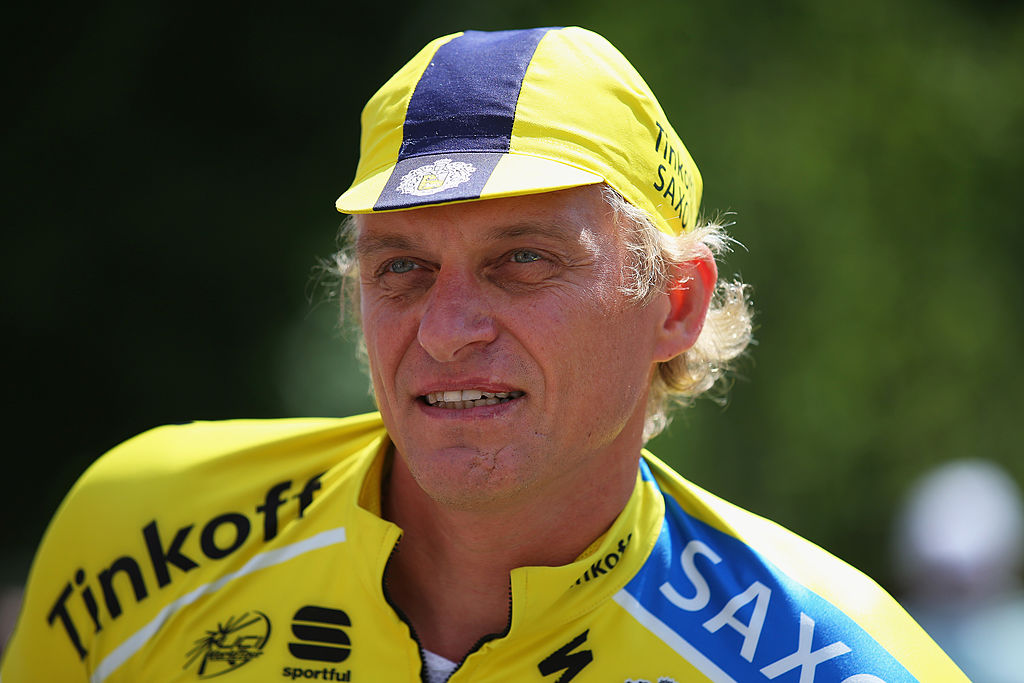Oleg Tinkov fears for his life after criticism of Russian invasion of Ukraine
Former team owner claims he lost billions in 'fire sale' of stake in Tinkoff bank

Oleg Tinkov has hired bodyguards and claims he has been forced to sell his 35 per cent stake in the Tinkoff bank for a fraction of its true value after being targeted in Russia for his criticism of the invasion of Ukraine.
The often controversial former WorldTour team owner walked away from professional cycling in 2016 and had focused on making Tinkoff one of the biggest online banks in Russia.
Alberto Contador won the 2015 Giro d’Italia with Tinkoff-Saxo in 2015 but Tinkov became so frustrated by Team Sky’s dominance at the Tour de France that he tried to buy out the British team. He gave a farewell interview to Cyclingnews in 2016.
Tinkov has been fighting leukaemia since 2019 and recently paid $507 million to settle a tax fraud case in the United States but always denied being an oligarch and a supporter of Russian President Vladimir Putin. He hit the headlines last month by criticising the war in Ukraine in one of the most outspoken comments against Russia’s invasion.
"I don't see a single beneficiary of this crazy war! Innocent people and soldiers are dying," Tinkov wrote on an Instagram post.
"The (Russian) generals, waking up with a hangover, realised that they had a shit army. And how could the army be good if everything else in the country is shit and mired in nepotism, sycophancy and servility?"
Speaking to the New York Times in his first interview since the war began and his Instagram post, Tinkov claimed that Putin’s administration threatened to nationalise his bank if it did not cut ties with him.
Get The Leadout Newsletter
The latest race content, interviews, features, reviews and expert buying guides, direct to your inbox!
Last week Tinkov sold his 35 percent stake in Tinkoff to a Russian mining billionaire in what he describes as a "desperate sale, a fire sale".
"I couldn’t discuss the price. It was like a hostage — you take what you are offered. I couldn’t negotiate," the New York Times quoted Tinkov as saying.
He explained that he had hired bodyguards after contacts in the Russian security services had told friends that he should fear for his life. Tinkov quipped that while he had survived leukaemia, perhaps "the Kremlin will kill me".
"They told me: ‘The decision regarding you has been made'," Tinkov told the New York Times. "Whether that means that on top of everything they’re going to kill me, I don’t know. I don’t rule it out."
Speaking out against Russia
The New York Times claimed Tinkov spoke out more forcefully against the war than any other Russian business leader.
"I’ve realised that Russia, as a country, no longer exists," Tinkov said.
"I believed that the Putin regime was bad. But of course, I had no idea that it would take on such a catastrophic scale."
The New York Times said the Kremlin did not respond to a request for comment, while Tinkoff Bank refuted Tinkov’s description of events, saying there had been "no threats of any kind against the bank’s leadership".
Tinkoff Bank confirmed to the New York Times that Tinkov had sold his entire stake to a company run by Vladimir Potanin, a mining magnate close to Putin.
"Oleg has not been in Moscow for many years, did not participate in the life of the company and was not involved in any matters," Tinkoff Bank said in a statement.
Tinkov offered a different version of events to the New York Times.
"They said: ‘The statement of your shareholder is not welcomed, and we will nationalise your bank if he doesn’t sell it and the owner doesn’t change, and if you don’t change the name'," Tinkov said, citing sources at Tinkoff he did not want to identify.
Tinkov did not disclose how much he obtained for his 35 per cent stake in Tinkoff Bank but admitted that he had sold at three per cent of what he believed to be his stake’s true value.
The New York Times suggested Tinkoff Bank was valued at more than $20 billion on the London stock exchange last year before the Russian invasion of Ukraine. Tinkoff had a share price of 79.44 on February 10 but has plummeted to just 3.19. Tinkov was sanctioned by the British government but the largely online Tinkoff bank continues to operate in Russia.
"They made me sell it because of my pronouncements. I sold it for kopecks," Tinkov said, a kopeck being a hundredth of a ruble.
"As long as Putin is alive, I doubt anything will change," Tinkov added.
"I don’t believe in Russia’s future. Most importantly, I am not prepared to associate my brand and my name with a country that attacks its neighbours without any reason at all."
Tinkov denied that he was speaking out in the hope of getting sanctions against him in Britain lifted but he said he hoped the British government would eventually "correct this mistake".
Tinkov claimed that many in the Russian elite are "in shock" about the war and have offered him support.
"They understand that they are tied to the West, that they are part of the global market," Tinkov said. "They’re fast, fast being turned into Iran. But they don’t like it. They want their kids to spend their summer holidays in Sardinia."

Stephen is one of the most experienced member of the Cyclingnews team, having reported on professional cycling since 1994. He has been Head of News at Cyclingnews since 2022, before which he held the position of European editor since 2012 and previously worked for Reuters, Shift Active Media, and CyclingWeekly, among other publications.